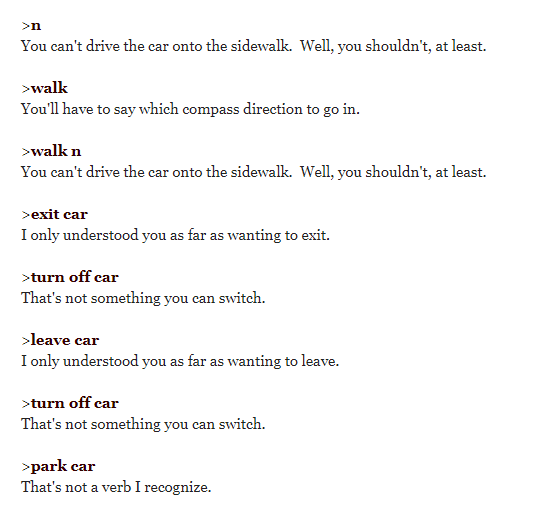I chose to play Hunger Daemon, a parser game where disaster strikes during your cult meeting, and you have to try and set things right – reclaim an important artifact that gets stolen during a ceremony. I made it through the initial section, and investigated a few of the initial areas that are available after you exit the first building. I didn’t actually finish the game, in no small part thanks to some of the idiosyncrasies of parser games.
I did find the setting itself compelling – a quotidian, modern-day cult is something I don’t encounter very often in media. The initial section, where you don’t have any real agency but just have to listen to the drone of the cult ceremony was an excellent in media res beginning, and the discovery of the stolen heart (and your injured colleague) juxtaposed with concern over a sandwich does a good job of expanding on the initial tone. However, I quickly ran into some issues due to the parser itself, which ended up cutting my playthrough short.
The basic verb set: cardinal directions, up/down, enter(or inside)/exit, look, examine, and take, are all present. The top bar highlighting the exits available at every point in the game are useful as well. However, when the way they were combined with verbs was far from intuitive. One of the first things that you do is get into your car to check out some other locations. ‘enter car’ – easy enough. Traveling in the car is no problem, just type in a cardinal direction. However, actually exiting the car was another matter entirely.
For context, I was trying to go north, to the bookstore. Here are the commands I tried:

The initial rejection of ‘north’ made sense; you’re in a car. Then, you can see me trying to figure out how to exit the car. After ‘exit car’ — the parallel to the ‘enter car’ command — failed, I tried a whole range of other options, and tried to reason out what in the world it wanted from me.
Ultimately, it turned out a simple ‘exit’ was enough. However, that didn’t parallel the initial command I used to get into the car, so it just wasn’t top of mind when trying to figure out how to get out. In the end, I actually just stopped here for a day – if I hadn’t been specifically playing this for the critical play, I wouldn’t have come back. Although the freedom the parser offered was initially compelling, this sort of friction was a massive downside. Although my specific issue seems fairly avoidable, it also makes me wonder how many different places other people have gotten stuck where the right move may have been obvious to the designer, or those well-versed in the specific grammar of parsers.
The seams also started to show fairly quickly. For example, when I was investigating an occult bookstore, I tried to examine it just to see what would happen.

It turned out that, when I examined the top floor, it automatically gave me descriptions, and let me interact with, a character on the floor below that I hadn’t actually accessed yet, presented without any context. It ended up making what would have otherwise been a cool reveal – a secret passageway, a ritual gone wrong! – into something confusing and disjointed.
All told, this experience made me a bit wary of creating a parser game. Although the story itself was well-crafted, and the writing had a solid voice, the issues with it took me completely out of the story. I think this is one of the downsides of interactive fiction: not only do you have to account for player agency when conveying the narrative, but you also have to account for the challenges specific to game-making. I did end up playing most of the game, but the thing that I’ll remember most clearly may be the issues I had, not the story itself.


